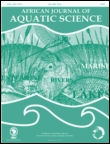
AFRICAN JOURNAL OF AQUATIC SCIENCE
metrics 2024
Exploring the depths of biodiversity and conservation.
Introduction
AFRICAN JOURNAL OF AQUATIC SCIENCE, published by TAYLOR & FRANCIS LTD, is a premier scholarly journal dedicated to the field of aquatic science, ecology, and environmental management, playing a crucial role in advancing research and knowledge in these vital areas. With an impressive Q2 ranking in both Aquatic Science and Ecology, Evolution, Behavior and Systematics, the journal seeks to publish high-quality research encompassing a wide range of topics related to freshwater and marine ecosystems, including biodiversity, conservation strategies, and the impacts of climate change. Featuring a rich history of publication from 2000 to 2024, the journal not only embraces rigorous peer review but also aims to foster collaboration and dialogue among researchers, practitioners, and students interested in aquatic environments. Readers will find that the journal’s commitment to impactful scientific communication is reflected in its notable rankings within the Scopus database, making it an essential resource for those engaged in aquatic research and management.
Metrics 2024
 0.56
0.56 1.10
1.10 1.70
1.70 37
37Metrics History
Rank 2024
Scopus
IF (Web Of Science)
JCI (Web Of Science)
Quartile History
Similar Journals

LIMNETICA
Connecting researchers to the pulse of aquatic science.LIMNETICA is a prestigious academic journal dedicated to advancing the field of Aquatic Science, Ecology, and Water Science and Technology. Published by the Asociación Española de Limnología in Spain, this journal serves as a vital platform for researchers and professionals seeking to share their findings and insights from 1996 to 2024. With a commendable Q2 ranking in Ecology and notable Q3 rankings in Aquatic Science and Water Science and Technology, LIMNETICA emphasizes high-quality, peer-reviewed research that contributes to our understanding of freshwater ecosystems. Although currently not classified under Open Access, its rigorous indexing and Scopus rankings—positioning it in the top 64th percentile for Environmental Science—illustrate its impact in the scientific community. Researchers, students, and professionals are encouraged to engage with LIMNETICA to stay abreast of key developments and foster collaborative efforts in aquatic research.
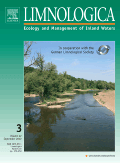
LIMNOLOGICA
Unveiling the Secrets of Freshwater BiodiversityLIMNOLOGICA is a prestigious academic journal dedicated to the field of aquatic sciences, published by Elsevier GmbH, a leading global publisher known for its commitment to disseminating high-quality research. With an ISSN of 0075-9511 and an E-ISSN of 1873-5851, the journal has established itself as a vital source of scholarly articles, reviews, and case studies since its inception in 1974. Operating from its base in Munich, Germany, LIMNOLOGICA provides a forum for researchers and professionals to explore contemporary issues in limnology, ensuring important contributions to the understanding of freshwater ecosystems. Recognized in the 2023 rankings, the journal boasts a respectable Q2 quartile in Aquatic Science, ranking #98 out of 247 in Scopus, placing it in the 60th percentile among its peers. While currently not an open-access journal, it continues to attract a wide readership by providing insights into ecological processes, conservation strategies, and the impacts of anthropogenic changes on freshwater environments. This makes LIMNOLOGICA an essential resource for anyone engaged in aquatic research, conservation efforts, and environmental policy development.
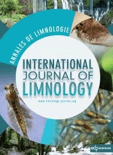
ANNALES DE LIMNOLOGIE-INTERNATIONAL JOURNAL OF LIMNOLOGY
Championing Open Access to Aquatic ResearchANNALES DE LIMNOLOGIE-INTERNATIONAL JOURNAL OF LIMNOLOGY is a distinguished scientific journal dedicated to the field of limnology, focusing on freshwater ecosystems and their ecological dynamics. Published by EDP SCIENCES S A, this journal has been a vital resource for researchers and professionals since 1965, fostering a deep understanding of aquatic environments through quality research and scholarly discussions. The journal was indexed in Scopus, where it ranked in the 37th percentile within the Agricultural and Biological Sciences category, emphasizing its contribution to aquatic science. While its coverage has been discontinued in Scopus since 2021, the journal continues to engage its readership with critical insights and reviews in limnology. ANNALES DE LIMNOLOGIE promotes open access to facilitate the dissemination of valuable knowledge, making it an essential platform for students, researchers, and professionals who strive to advance our understanding of freshwater systems.

INTERNATIONAL REVIEW OF HYDROBIOLOGY
Exploring the Depths of Ecology and EvolutionINTERNATIONAL REVIEW OF HYDROBIOLOGY is a prestigious academic journal dedicated to the dynamic fields of Aquatic Science and Ecology, Evolution, Behavior, and Systematics. Published by a reputable German publisher, this open-access journal ensures that groundbreaking research is readily available to a global audience, fostering collaboration and innovation within the scientific community. With an impressive impact factor and classification within the Q2 category of both Aquatic Science and Ecology, it ranks notably high on Scopus, standing at 211 out of 721 in Ecology and 84 out of 247 in Aquatic Science as of 2023. Covering a broad scope from fundamental hydrobiological research to applied ecological studies, the journal plays a crucial role in advancing knowledge and addressing contemporary environmental challenges. Researchers, professionals, and students will find INTERNATIONAL REVIEW OF HYDROBIOLOGY to be an essential resource for informing their own work and contributing to the global dialogue on aquatic systems and their conservation.

Inland Water Biology
Exploring the Depths of Freshwater EcosystemsInland Water Biology is a distinguished peer-reviewed journal published by MAIK NAUKA/INTERPERIODICA/SPRINGER, focusing on the intricate interactions within freshwater ecosystems. With its ISSN (1995-0829) and E-ISSN (1995-0837), this journal has established itself as an essential resource for researchers and professionals in the fields of Aquatic Science and Ecology, evidenced by its consistent ranking in the Q3 category for both disciplines in 2023. Covering a wide array of topics related to the biology of inland waters, the journal aims to disseminate cutting-edge research findings and theoretical advancements that contribute to the understanding of aquatic environments and their ecological significance. Although it does not offer open access, its impact in the academic community is noteworthy, ensuring that published works undergo rigorous peer review. Researchers, professionals, and students alike will find valuable insights and innovative approaches within its pages, making Inland Water Biology a vital addition to their academic endeavors.
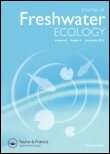
JOURNAL OF FRESHWATER ECOLOGY
Fostering a deeper understanding of freshwater environments.JOURNAL OF FRESHWATER ECOLOGY, published by Taylor & Francis Inc, is an esteemed source of research dedicated to advancing the understanding of freshwater ecosystems. Established in 1981, this Open Access journal has provided a platform for innovative studies and groundbreaking articles relevant to the fields of Aquatic Science and Ecology. With its HIndex reflecting a commitment to quality scholarship, the journal is currently classified in the Q3 category for both Aquatic Science and Ecology, Evolution, Behavior and Systematics, indicating its respectable impact within these disciplines. The journal ranks within the 45th percentile in Ecology and the 41st percentile in Aquatic Science on Scopus, highlighting its relevance to a global audience of researchers and practitioners. By facilitating unrestricted access to research findings since 2017, JOURNAL OF FRESHWATER ECOLOGY aims to enrich our understanding of freshwater systems and their conservation, making it an essential resource for those invested in ecological research and environmental sustainability.

GULF AND CARIBBEAN RESEARCH
Fostering Interdisciplinary Dialogue on Water ScienceGulf and Caribbean Research is an esteemed academic journal published by the University of Southern Mississippi, dedicated to advancing the understanding of aquatic ecosystems in the Gulf of Mexico and the Caribbean region. With an ISSN of 1528-0470 and an E-ISSN of 2572-1410, the journal serves as an essential platform for researchers and professionals in the fields of Aquatic Science, Oceanography, and Water Science and Technology, recognized in the 2023 Q3 Quartile rankings across these disciplines. The journal welcomes diverse contributions including original research, reviews, and technical notes, encouraging interdisciplinary approaches to address ecological and environmental challenges within its scope. Despite the absence of an open access option, it provides invaluable insights, evidenced by its Scopus rankings, which position it within the 31st to 33rd percentile across various related categories. The engaging research articulated in Gulf and Caribbean Research fosters dialogue and collaboration, making it a vital resource for those committed to scientific discovery and conservation efforts in these critical aquatic environments.

LIMNOLOGY
Pioneering Research for Ecological ResilienceLIMNOLOGY, published by SPRINGER JAPAN KK, serves as a premier platform for the dissemination of high-quality research in the fields of aquatic science, ecology, and water science and technology. With an ISSN of 1439-8621 and an E-ISSN of 1439-863X, this respected journal has consistently maintained a Q2 ranking in its respective categories as of 2023, reflecting its impact and relevance in the academic community. Operating from its base in Tokyo, Japan, LIMNOLOGY engages a diverse audience of researchers, professionals, and students who are focused on advancing knowledge related to freshwater systems and their ecological health. This journal covers a wide range of topics within its scope from the year 2000 to 2024, highlighting essential studies that contribute to both theoretical and applied aspects of limnology. Although this journal is not open access, its rigorous peer-reviewed articles are crucial for driving innovation and fostering dialogue among scientists and environmentalists dedicated to understanding and preserving water ecosystems.

LAKE AND RESERVOIR MANAGEMENT
Elevating the discourse on water quality and ecosystem services.LAKE AND RESERVOIR MANAGEMENT is a premier academic journal published by Taylor & Francis Inc, providing a dedicated platform for the dissemination of high-quality research and innovations in the field of aquatic management. With an ISSN of 1040-2381 and an E-ISSN of 2151-5530, the journal encompasses a broad spectrum of topics related to the sustainable management and ecological assessment of lakes and reservoirs. As an essential resource for researchers, professionals, and students involved in environmental science, hydrology, and water resource management, the journal aims to address critical issues such as water quality, ecosystem services, and the impact of human activities on aquatic systems. Additionally, the journal promotes interdisciplinary approaches that foster collaborative solutions for effective management of aquatic resources. Although it currently does not offer open access, LAKE AND RESERVOIR MANAGEMENT remains influential in shaping policies and practices within the field, making it a vital read for anyone dedicated to advancing knowledge and practice in aquatic ecosystem management.
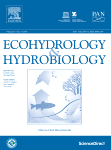
ECOHYDROLOGY & HYDROBIOLOGY
Innovating solutions for sustainable aquatic ecosystems.ECOHYDROLOGY & HYDROBIOLOGY, published by the European Regional Centre Ecohydrology Polish Academy of Sciences, is a leading journal in the field of Aquatic Sciences, recognized for its impactful contributions with a 2023 Scopus ranking placing it in the top 20% of its category. Established in 2001 and converging scholarly insight until 2024, this journal aims to advance knowledge on the interactions between hydrological cycles and biological communities, providing a platform for innovative research that addresses critical environmental challenges. With a Q1 quartile classification, it is an essential resource for researchers, professionals, and students dedicated to exploring sustainable aquatic ecosystems. Although it follows a traditional subscription model, the journal maintains a commitment to disseminating high-quality research that informs policy and practice in the field. Located in Portugal and operating out of Lodz, the journal invites a diverse global readership to engage with its comprehensive range of articles and studies.